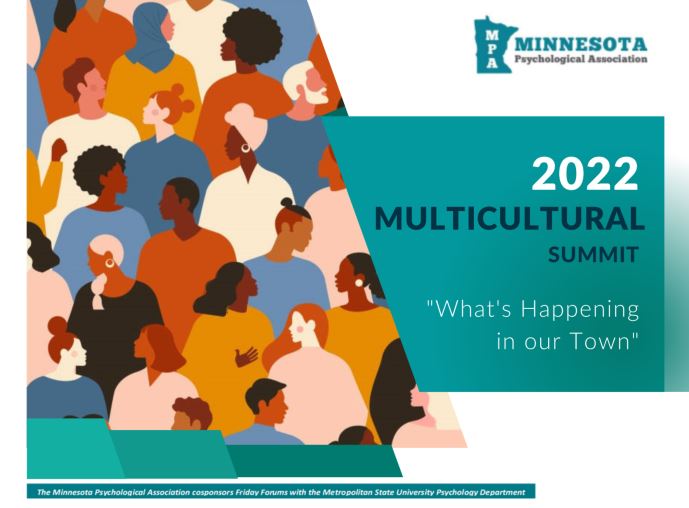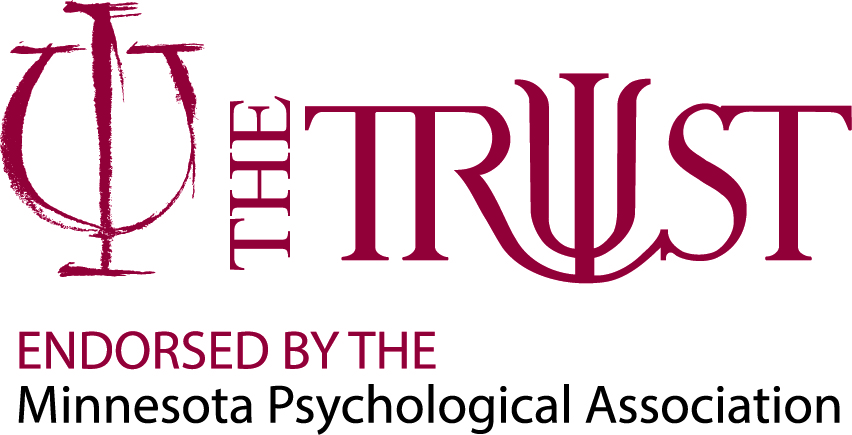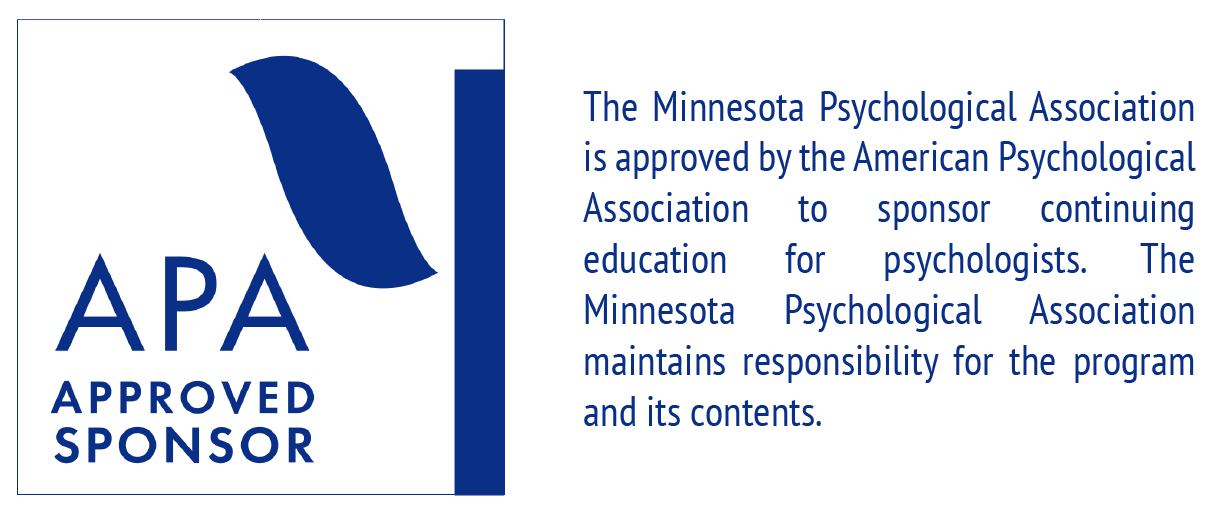
Virtual Full Day First Friday Forum: 2022 Multicultural Summit - "What's Happening in our Town"
Program: Friday, November 4, 2022 8:30 a.m. - 4:00 p.m. CT. Earn 6 CE Credits
Friday Forums are cosponsored with the Metropolitan State University Psychology Department.
Level: Intermediate: Assumes post-doctoral education status and general familiarity with topic. It is designed for psychologists and other mental health professionals.
Location: Registrants will be sent a Zoom link for the program the day before (11/3).
Click here to register.
Get involved today by being a sponsor of the MPA Minnesota Multicultural Conference. As a sponsor, you will receive recognition before and throughout the conference. Click here to learn more!
Thank you to our Sponsors:
Platinum Sponsor: Silver Sponsor:
 
Bronze Sponsor: Bronze Sponsor:
 
About the Summit: Experts in psychologists' role in social justice, developmental disruption, and disability will set the stage for important conversations about these topics. While research in psychology serves as the backbone of this conference, attendees will be challenged to integrate that research with lived experiences as they move toward greater multicultural competence.
8:15 am - 8:30 am Login to Virtual Summit*
8:30 am - 10:15 am Lifelong Consequences of Emotional Underattunement, Emotional Malnourishment, and Emotional Neglect
Phyllis Solon, Psy.D., LP
10:15 am - 10:30 am Break*
10:30 am - 11:30 am Disability as Diversity
Angela Folie, Psy.D.,LP, CBIS
11:30 am - 12:00 pm Difficult Dialogue
12:00 pm - 1:00 pm Lunch Break*
1:00 pm - 2:30 pm Keynote: Psychologists' Role in Social Justice
Talee Vang, Psy.D., LP
2:30 pm - 2:45 pm Break*
2:45 pm - 4:00 pm Difficult Dialogue and Wrap Up
Must attend the entire conference to receive credit. No partial credits will be given.
*CE credits not awarded for these activities
Keynote: Psychologists' Role in Social Justice
Social injustices seem to be growing exponentially. Racism, xenophobia, reproductive rights, transgender healthcare, and climate change are topics that are often emotionally charged and these days, can be viewed as divisive. Organizations, leaders, and individuals may struggle with whether to bring these conversations into the workplace or to bring these topics up with patients. Psychologists know social exclusion can lead to emotional pain. There are consequences to chronic social exclusion, which is why inclusion and belonging are important to diversity and equity work. Dr. Talee Vang discusses psychologists' role in social justice, strategies to address inequities, and highlight tools that psychologists already have to combat injustices.
Participants will be able to:
- Explain the human design to survive.
- Identify psychological tactic used to advance divisiveness.
- Apply strategies to address social injustices.
Talee Vang, Psy.D., LP, is personable, authentic, and engaging, Dr. Talee Vang is a licensed psychologist with expertise in diversity, equity, and inclusion (DE&I), as well as health equity. Her educational background as a social scientist and reputation as an effective educator perfectly positions her to help organizations in their evolutional growth. She received a Psy.D., from the University of St. Thomas in Counseling Psychology. Skilled at conceptualizing complexity, tailoring strategies and trainings to the unique need of any organization. Dr. Van has a collaborative style that offers expertise, while establishing sustainable methodology for clients to use into the future. Evidence based theories, as well as strategies, and interventions rooted in human and organizational psychology inform the content and work Dr. Vang brings.
The speaker has indicated no conflicts of interest
Lifelong Consequences of Emotional Under-attunement, Emotional Malnourishment, and Emotional Neglect
This presentation will detail four developmental areas-distress tolerance, emotional regulation, empathy, and sense of self-disrupted by emotional under attunement in the first five years of life. Adult attunement and emotional stability provide coregulation for infants and children which supports the neurological architecture for cognitive, emotional, relational, and social development. Absent, authoritarian, permissive, and chaotic parenting styles can all undermine a child's experience of themselves as capable important , valued and loved. Without this scaffolding, the world is a scary unpredictable place filled with people who cannot be counted on to care or consistently meets ones' needs. Adolescents and adults exposed to neglect in childhood have higher rates of internalizing disorders including, anxiety, depression, and Complex PTSD and high risk of substance use disorders. Recognizing family interaction patterns of neglect can reduce long help experiences of shame that get lodged in the body of children who had no help. This lays the groundwork for developing radical acceptance and self-compassion, skills which can help people heal long standing difficulties that get in the way of creating the life that they want base in their values.
Participants will be able to:
- Explain how emotional neglect compromises the development of distress tolerance, emotion regulation, empathy, sense of self.
- Describe four parenting styles of emotional under-attunement and the behavioral, emotional and relational dequalae in adoescence and adulthood.
- Practice the basics of Present Orientation, Radical Acceptance, and Self-compassion.
Phyllis Solon, Psy.D., LP, received a Psy.D. in Clinical Psychology from the Minnesota School of Professional Psychology. Dr. Solon is currently adjunct faculty at St. Mary's University of Minnesota School of Graduate Studies Doctoral Program in Counseling Psychology. Her main areas of expertise involve trauma, autism spectrum and other neurological syndromes, and multicultural work.
The speaker has indicated no conflicts of interest.
Disabilities as Diversity
Often overlooked in discussions of diversity, but people with disabilities are one of the largest marginalized groups in society. People with disabilities are a distinct cultural group, with its own norms, language, and shared experiences. If you are an able-bodied therapist providing services to a client with a disability, then you are providing cross-cultural therapy. Lack of familiarity with disability many influence how a psychologist perceives and works with the emotions that clients with disabilities express. People with disabilities often experience lack of accommodations, personal slights, insensitive behavior, and discrimination. They may express feelings of sadness, anger and frustration about their disability experiences. A psychologist may perceive such expressions as a sign that a client has not adjusted to a disability, rather than as an emotional response to painful experiences. Self-examination and familiarity with disability related issues are two ways to minimize biases, faulty assumptions, and negative emotional reactions.
Participants will be able to:
- Describe the three main models of disability identity.
- Critically assess the role that biases and stigmatization may play in work with people with disabilities.
- Utilize strategies for building rapport and facilitating therapeutic change for clients with disabilities.
Angela Folie, Psy.D., LP, CBIS, is a clinical psychologist with specialization in health psychology and neuropsychology. She received her Psy.D. in Clinical Psychology from the Minnesota School of Professional Psychology. She joined the staff at Courage Kenny Rehabilitation Institute. (CKRI) in 2007. Dr. Folie has a limited outpatient practice with CKRI, but primarily works on the inpatient rehabilitation unit at Abbott Northwestern Hospital and has experience with providing services to a wide range of populations including spinal cord injury, stroke, brain injury, amputees, cerebral palsy, neuromuscular disorders and CNS disorders. Currently, she is the co-chair of the CKRI Acquired Brain Injury Program Committee and the Chair of the Psychology Section at Abbott Northwestern Hospital. She is also a member of the Allina Advanced Practice Providers Committee.
The speaker has indicated no conflicts of interest.
This program qualifies for 6.0 continuing education credits. Attendees must attend full-day program to gain continuing education or academic credit.
The Minnesota Psychological Association is approved by the American Psychological Association to sponsor continuing education for psychologists. The Minnesota Psychological Association maintains responsibility for this program and its content.
ACCESSIBILITY ACCOMMODATIONS: If you need disability related accommodations to make this event accessible, please contact the Metropolitan State University Center for Accessibility Resources, 651-793-1549, or [email protected].
| Type |
MPA Member |
Non-Member |
Student |
Retired Member (no CE credit)* |
Non Member (no CE credit) |
| |
$149.00 |
$169.00 |
$30.00 |
$30.00 |
$75.00 |
*Retired members have the option to pay the regular member rate to receive CE credit or take advantage of the discounted price with no CE.
MPA wants all members to have access to quality CE opportunities. If you are an MPA member and due to COVID-19 you are unable to work full time and can’t pay the full registration fee, please contact [email protected] to make other arrangements with staff.
Click here to register.
Click here to view/download a PDF version of the program flyer & registration form.
CONFIRMATION/CANCELLATION: You will receive an emailed confirmation of your registration. You will be notified by mail, e-mail or telephone if your selection is filled or cancelled.
REFUND POLICY: A 100% refund will be made if the event is cancelled. Refunds, less a $5 handling fee, will be given if a written cancellation is received at least two working days before the scheduled program begins. No refund or transfer is given the day of the program.
Get involved today by being a sponsor of the MPA Minnesota Multicultural Conference. As a sponsor, you will receive recognition before and throughout the conference.
Click here to learn more!

|









